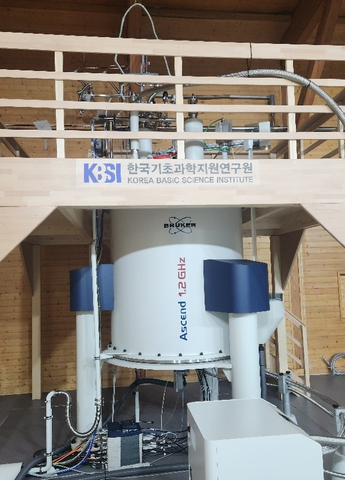Bruker Announces Successful Installation of 1.2 GHz Avance® NMR Spectrometer at the Korea Basic Science Institute (KBSI)
Asia’s first 1.2 GHz NMR system empowers researchers to advance scientific discoveries

1.2 GHz Avance® NMR system at Korea Basic Science Institute (KBSI)
This underscores KBSI’s unwavering commitment to innovation in research infrastructure, cementing its status as a world-class fundamental research institute. This cutting-edge 1.2 GHz NMR spectrometer further enhances KBSI’s capabilities in biomolecular structure analysis and drug development, pushing the boundaries of protein NMR research. Ultra-high field NMR provides excellent sensitivity and unprecedented resolution, enabling researchers to observe functional molecular dynamics and structural rearrangements in real time. Complementary to other structural biology technologies, GHz-class NMR allows KBSI to elucidate complex biological processes, such as protein-ligand interactions and the behavior of intrinsically disordered proteins, which are crucial for understanding disease mechanisms and developing new therapeutic strategies.
Dr. Hae-Kap Cheong, Manager of the UHF NMR system at KBSI, expressed his enthusiasm: “When using the 1.2 GHz instrument, the opportunities for small molecule research made me speechless. In particular, the structural elucidation of natural products will be greatly beneficial.”
Dr. Donghan Lee, Scientific Researcher at KBSI, adds: “As Richard Feynman said, ‘Everything that living things do can be understood in terms of the jiggling and wiggling of atoms.’ The function of biomolecules can be understood by their dynamic nature. In particular, the functional conformation of biomolecules may be hidden because of their dynamic nature. With the 1.2 GHz instrument, the detection of these conformations enables the unprecedented identification of functional conformations.”
KBSI is dedicated to advancing scientific research through state-of-the-art technology and innovative research facilities. As a platform for global basic research, KBSI connects research facilities, equipment, and researchers, driving the future of science and technology in the
Dr. Kyoung-Seok Ryu, Director of the Biopharmaceutical Research Center at KBSI, added: “The application of the 1.2 GHz instrument includes mechanistic understanding, in particular, the mode-of-action of drug-target binding and molecular communication. Furthermore, studying intrinsically disordered or partially disordered proteins with the 1.2 GHz NMR instrument can elucidate the functional mechanisms underlying neurodegeneration.”
KBSI will utilize the 1.2 GHz spectrometer for a diverse range of research applications, including the study of biomolecular structures and the development of new drugs. This ultra-high field NMR instrument will support other KBSI research in biomedical multiomics, bioimaging, and the development of diagnostic methods for infectious diseases. The broader benefits of this research will extend to advancements in medical research, materials science, and other critical fields.
Dr. Falko Busse, President of Bruker BioSpin, commented: “We are thrilled to see the 1.2 GHz NMR become a key part of KBSI’s research infrastructure. Grateful for the trust from KBSI, we look forward to the scientific advancements that will emerge. We are pleased to offer a tour of the 1.2 GHz NMR at KBSI during the International Conference on Magnetic Resonance in Biological Systems.”
Interested researchers can book the tour at Bruker Booth A1 at ICMRBS for Friday, August 23, providing a unique opportunity to explore the advanced capabilities of this revolutionary instrument.
With the installation at KBSI, there are now 22 GHz-class NMR spectrometers installed worldwide, including two in the
About Bruker Corporation – Leader of the Post-Genomic Era (Nasdaq: BRKR)
Bruker is enabling scientists and engineers to make breakthrough post-genomic discoveries and develop new applications that improve the quality of human life. Bruker’s high performance scientific instruments and high value analytical and diagnostic solutions enable scientists to explore life and materials at molecular, cellular, and microscopic levels. In close cooperation with our customers, Bruker is enabling innovation, improved productivity, and customer success in post-genomic life science molecular and cell biology research, in applied and biopharma applications, in microscopy and nanoanalysis, as well as in industrial and cleantech research, and next-gen semiconductor metrology in support of AI. Bruker offers differentiated, high-value life science and diagnostics systems and solutions in preclinical imaging, clinical phenomics research, proteomics and multiomics, spatial and single-cell biology, functional structural and condensate biology, as well as in clinical microbiology and molecular diagnostics. For more information, please visit www.bruker.com.
View source version on businesswire.com: https://www.businesswire.com/news/home/20240813101964/en/
Investor Contact:
Joe Kostka
Associate Director - Investor Relations
Bruker Corporation
T: +1 (978) 313-5800
E: Investor.Relations@bruker.com
Media Contact:
Markus Ziegler
Sr. Director and Head of Group Marketing
Bruker BioSpin
T: +49 172 3733531
E: pr@bruker.com
Source: Bruker Corporation








